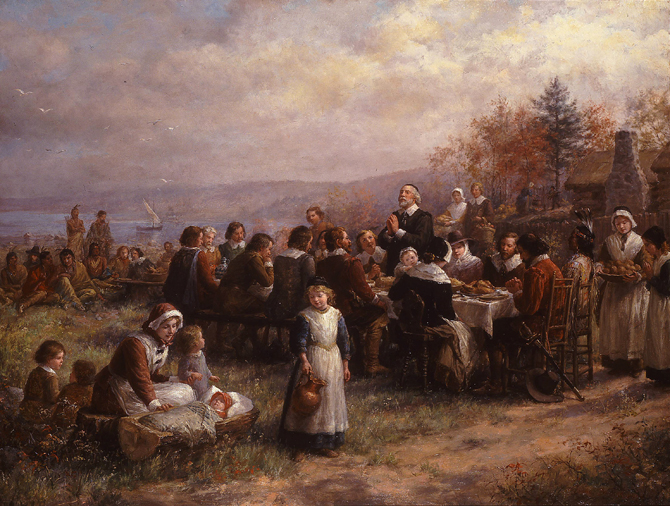Celebrate Thanksgiving with Two Inspiring Folk Songs!
Are you like me— dismayed by the overwhelming retail push of Christmas as soon as Halloween is over? The trick or treaters were barely home and counting their candy before the TV commercials started blaring their holiday shopping ads. The Hallmark Channel actually started showing their annual marathon of Christmas movies before Halloween, on October 26th! And soon after, some radio stations started their all-Christmas song format. What’s wrong with this picture?! Everything! How about we just celebrate Thanksgiving first?! It’s our uniquely American holiday, a beautiful one that speaks to our heritage as a nation of immigrants. It also speaks to the religious conviction of those early settlers, who in 1621 wanted to give thanks to God for their first harvest in the New World.
Every elementary school child learns about the Pilgrims landing at Plymouth Rock, and about the First Thanksgiving. They may even get to dress up for a school pageant as those early colonists, or as the Indians, or even as a turkey! And of course as adults, we all love to have our own feasts, gather with family and friends, and give thanks for our blessings, as well as for a few days off from work! But if you’ve ever had the moving experience of visiting historic Plymouth, Massachusetts, actually seeing Plymouth Rock, and viewing a life-size replica of the Mayflower (how did they cross the Atlantic ocean in something as small as that?!), Thanksgiving takes on a much deeper meaning. The bravery, struggles and depth of spiritual conviction of the Pilgrims inspires even to this day. So in that spirit, I found myself thinking of two of my favorite folk hymns…
Amazing Grace
“Amazing Grace” is a Christian hymn with words written by the English poet and Anglican clergyman John Newton (1725–1807). As a child, Newton was not raised with any particular religious conviction. In fact, as an adult he actually became a slave trader. On one of his voyages during a violent storm at sea, he called out to God for mercy. He survived the tempest, and eventually began his study of Christianity. He was ordained in the Church of England in 1764, and began to write hymns to illustrate his sermons. Amazing Grace was published in 1779, but did not enjoy great notice. In the United States, though, it became popular in the early 19th century, and in 1835 was joined to a tune named “New Britain”, the melody by which we sing the song today. With its universal theme of thanksgiving and redemption, it is the most well-known of folk hymns, and has popularity in both the sacred and secular worlds. Let’s listen to this iconic version recorded by legendary pop vocalist Judy Collins:
The lyrics:
Amazing grace! How sweet the sound
That saved a wretch like me!
I once was lost, but now am found;
Was blind, but now I see.
Through many dangers, toils and snares,
I have already come;
’Tis grace hath brought me safe thus far,
And grace will lead me home.
The Lord has promised good to me,
His Word my hope secures;
He will my Shield and Portion be,
As long as life endures.
Yea, when this flesh and heart shall fail,
And mortal life shall cease,
I shall possess, within the veil,
A life of joy and peace.
The earth shall soon dissolve like snow,
The sun forbear to shine;
But God, who called me here below,
Will be forever mine.
When we’ve been there ten thousand years,
Bright shining as the sun,
We’ve no less days to sing God’s praise
Than when we’d first begun.
Most of us only know the first verse. How lovely to get the entire depth and breadth of the poem as it was originally written!
Come Thou Font of Every Blessing
“Come Thou Fount of Every Blessing” is another Christian hymn written by the 18th century English pastor Robert Robinson (1735-1790). He wrote the words at only 22 years of age, in 1757. Five years earlier, Robinson had attended an evangelical meeting to heckle the believers and make fun of the proceedings. Instead, he listened in awe to the words of the great preacher George Whitefield, and ultimately became a Christian. Another three years later, when preparing a sermon for his own church in Norfolk, England, he penned the words that have become one of the church’s most-loved hymns: “Come, thou fount of every blessing, tune my heart to sing thy grace.”
Using imagery of Christ as the giver of living water and the shepherd gathering his sheep back into the fold, this hymn reminds the worshiper of the ever-bountiful grace of God. While humans are “prone to wander,” the lyrics state that God continues to bring us back from our wandering. The poem goes on to say that then with songs of praise on our lips, we can dance forever on the “mount of His redeeming love”. The lyrics, which dwell on the theme of divine grace, are based on 1 Samuel 7:12 of the Bible, in which the prophet Samuel raises a stone as a monument (called an “Ebeneezer”), saying, “Hitherto hath the Lord helped us” (King James Version).
In the United States, the tune “Nettleton” has been the most common musical setting for this famous and well-loved text. This melody first appeared in John Wyeth’s Repository of Sacred Music, Part Second (1813).
Let’s listen to a stirring and dynamic choral arrangement, beautifully sung by the Atlanta Master Chorale and Morehouse College Glee Club. Give a special ear to that super-high soprano part as the piece builds to its exciting climax:
The Lyrics:
Come, Thou Fount of every blessing
Tune my heart to sing Thy grace
Streams of mercy, never ceasing
Call for songs of loudest praise
Teach me some melodious sonnet
Sung by flaming tongues above
Praise the mount, I’m fixed upon it
Mount of Thy redeeming love
Here I raise my Ebenezer
Here there by Thy great help I’ve come
And I hope, by Thy good pleasure
Safely to arrive at home
Jesus sought me when a stranger
Wandering from the fold of God
He, to rescue me from danger
Interposed His precious blood
Oh, that day when freed from sinning
I shall see Thy lovely face
Clothed then in the blood washed linen
How I’ll sing Thy wondrous grace
Come, my Lord, no longer tarry
Take my ransomed soul away
Send Thine angels now to carry
Me to realms of endless day
Oh, to grace how great a debtor
Daily I’m constrained to be
Let that goodness like a fetter
Bind my wandering heart to Thee
Prone to wander, Lord, I feel it
Prone to leave the God I love
Here’s my heart, oh, take and seal it
Seal it for Thy courts above
Here’s my heart, oh, take and seal it
Seal it for Thy courts above
As a singer, I especially love the analogies of the first verse– “Tune my heart to sing thy grace” and especially “teach me some melodious sonnet, sung by flaming tongues above”. What great poetic imagery! Hearing this always takes me back to singing a another fabulous arrangement from my college choir days at California State University, Long Beach. Under the direction of the great conductor Frank Pooler, it’s a memory that never fails to feed my soul and warm my heart…
I hope you’ve found some new inspiration after hearing these two hymns of grace and gratitude! For more ways to find gratitude in your life, see my earlier post: Gratitude: It Helps Your Singing, and Your Life! And, just gazing at the beautiful painting featured above, Thanksgiving at Plymouth, painted in 1925 by American Artist Jennie Augusta Brownscombe (1850-1936), brings a moment of calm and peaceful reflection that is part of this wonderful holiday. I display a copy of this painting every year to add to my students’, and my own, Thanksgiving spirit…
In our hustle-bustle, stressful, crazy world, it’s so easy to get overwhelmed, discouraged, cynical and just plain exhausted. Being able to listen to and sing these two beloved, time-honored folk hymns, Amazing Grace and Come Thou Font of Every Blessing, always reminds me to count my blessings, no matter how difficult life has been. What better time than Thanksgiving to remember these songs, and to count your blessings, too!







